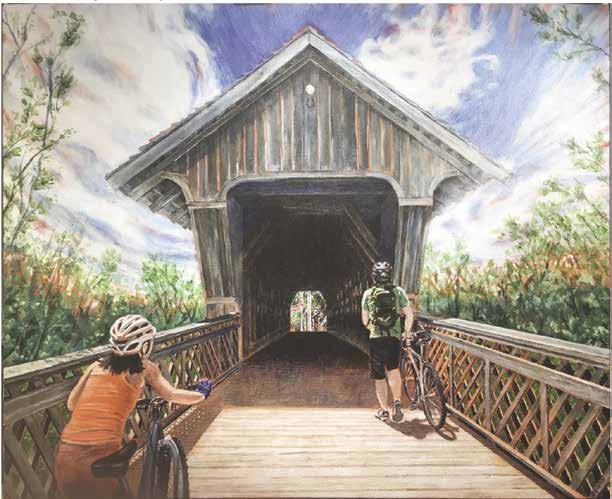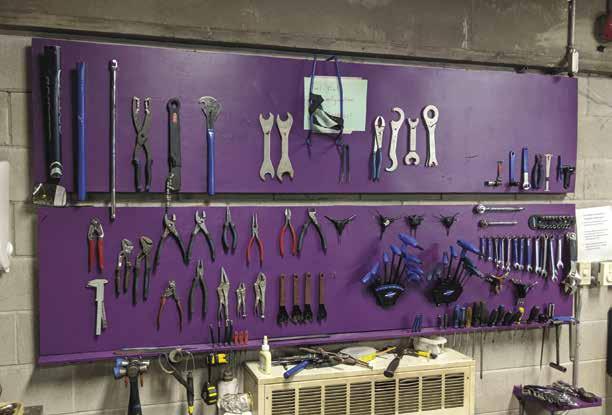
9 minute read
17 When essential is subjective: CSA bike centre closed for the past year
from The Ontarion - 190.5
by The Ontarion
Taylor Pace
Throughout the pandemic, the bicycle industry in Canada has simultaneously been faced with the highest demand and lowest supply it’s ever seen; with the limitations of public transit and a need for safe exercise, more and more people seem to be biking.
Yet, the CSA Bike Centre at the University of Guelph, which has been around for about 20 years, has remained closed since March 2020, forcing the community to go elsewhere for their bike service needs.
“It’s been a record breaking year for bike sales, bike stores are running out of stuff. The bike centre is here with it’s doors closed,” said Giancarlo Martini, a fifth-year environmental engineering student who has worked as the repair coordinator for the past two years, and was a volunteer for two years prior to that.
On March 29 the centre was broken into, and bikes, parts, and tools were stolen. Martini said this likely happened because “people are desperate for services.”
He said it’s been especially crucial during the pandemic because many more people are riding bikes, or riding bikes more often, since they don’t want to take the bus.
When asked why the bike centre has remained closed while other centres are still open, CSA President Tyler Poirier told The Ontarion that there are several factors at play, the biggest one being their “lack of capacity throughout the pandemic,” adding that he understands the closure has “negatively affected many who are passionate about cycling,” and is looking forward to seeing it reopen.
Martini, alongside other advocates for the centre, have been trying to convince the CSA to reopen the doors since they closed last year, meeting with the CSA over the summer and into the fall semester.
Fourth-year water resources engineering student Michelle Robinson was a volunteer for one year and then hired as the volunteer coordinator, but her contract was cut short when the centre closed. She told The Ontarion that in an attempt to address their concerns, in the fall semester the CSA began doing things like uploading bike repair videos online. They also provided a $40 gift card to the first 50 students who signed up to receive bike service at Speed River Bicycles, a bicycle store in downtown Guelph that sells bikes and bike parts, and offers repair services.
“Forty dollars covers nothing for a bike,” said Spencer Ploeger, who is a fifth-year engineering systems and computing student, and has been a volunteer since 2016.
For example, he said a common fix is new brake pads, which “might cost $40 before tax if you’re lucky, and that’s before paying an additional $40 to get them put on.”
For those that don’t know, the bike centre, which shares a building with the campus food bank, is basically a DIY bike repair centre with specialty tools and bins of used parts that both students and community members can use.
There are also around 25 knowledgeable volunteers who can help with anything else you might need, including helping you learn to repair your bike.
More than that though, it was a welcoming and diverse
— Max Ornat


space, supplying people with a sense of community. Robinson said people would often come to just “hang out and help others.”
In terms of paid staff, there are normally three volunteer coordinators, a central coordinator, a volunteer coordinator, and a repair coordinator; all of these positions have been laid off.
“It’s been frustrating knowing that this building is sitting empty, and that there are ways for it to be open in compliance with the university’s requirements for health and safety,” Robinson said, adding that it’s especially frustrating because other cities have managed to keep their bike centres open, like University of Toronto’s Bikechain and the London Bicycle Cafe.
Ben Cowie, owner and operator of the London Bicycle Cafe told The Ontarion the reason they’ve stayed open is simple: bikes are vehicles under Ontario law, and vehicles are considered essential services.
While the community that relies on the CSA’s centre may be small, they have been devastated by its closure.
For instance, people regularly ask former bike centre staff and volunteers if they can get into the bike centre to grab parts.
Bill Raymond, a fifth-year environmental engineering student, says he hasn’t been able to maintain his bike like he normally would since the bike centre closed.
This has caused his bike, which is his main form of transportation, to deteriorate over the winter.
“When using a bike as transportation, you use it everyday, much more frequently than if you were using it just for sport. Therefore, parts wear out faster, shifters and brakes require tuning more frequently, tires need to be pumped more frequently, the chain requires cleaning and oiling more frequently,” Raymond said. “These effects are compounded in the winter, as snow, salt and other grime accelerate the deterioration of the bike components.”
Without the help of the bike centre, he’s unable to do this maintenance by himself.
Fifth-year environmental engineering student Max Ornat told The Ontarion that he especially misses the sense of community it provided.
“The bike centre provided a safe space for all. Everyone left with a smile on their faces regardless of the stuff going on in their lives,” he said. “Not only that, but the bike centre has access to so many essential tools and parts that are both extremely expensive and difficult to find elsewhere.”
These services are free for all students and community members to use, and in peak season, Ploeger said they could have up to 150 people coming in each week, relying on the service.
“Without the bike centre, there isn’t really a similar service that can provide the same level of quality service and sense of belonging. Especially in times like these, community bonding is perhaps what we’re all in need of the most,” Ornat said.
In regards to the service being closed for the past year, he said it felt like the “CSA just forgot about the bike centre, or that they don’t really care about it at all. It’s also been difficult to maintain my bike, especially after riding in harsh winter conditions.”
There are several bike shops in town that offer services, but they come at a cost, and many have low stock, so it might be difficult to find what you need.
“I couldn’t buy a bike tire at the place where [the CSA] gave the gift cards to; they had literally no stock that I needed, and I know there’s like 15 of them sitting at the bike centre,” Ploeger said.
Robinson noted that the CSA has prioritized other services such as The Bullring to open when there are other food places on campus, “but there is no accessible bike service on campus.”
“We made this document that outlines how the bike centre could be run safely during COVID, and that comes from my experience with me working at a shop already during COVID, and just knowing the bike centre really in and out.” Martini said.
Martini noted that it didn’t seem like anyone at the CSA thought the centre was worthwhile.
“None of these people ride bikes to school, or around town; they don’t depend on a bike for anything, so they didn’t see it the same way that we did.” Martini said. “It’s not essential to everyone, but it is essential to a certain community. It’s essential to us.”
However, Poirier said that it “wasn’t about a lack of desire to open the service; all the CSA executives and staff want and have wanted to see the bike centre reopen. It took until the last meeting to start this working group because we are finally in a position to accommodate this undertaking.”
In March 2021, after a year of meetings that yielded no action, Martini, Robinson, and Ploeger sent a letter to the CSA, pleading to reopen the “once thriving and essential service.”
The letter led to them speaking at the CSA meeting on April 7, after which the CSA promptly formed a committee to put together a plan to reopen the centre, made up of Martini, Ploeger, Robinson, and CSA member Bella Harris.
They have until the next CSA meeting on May 26 to come up with a plan; at the time of writing, no committee meetings have taken place.
While they are eager to get to work, they say they are skeptical about the committee accomplishing all that much, and are unclear on what exactly the purpose of the committee is.
“I don’t know if the CSA intends for this to [lead to] opening, or if they intend for this to just be more discussions informing them about the bike centre and trying to get them on the same page as us,” Robinson said.
“They keep saying we need to hire a coordinator, but if they’re not willing to hire someone, I don’t think any progress will actually be made,” Robinson said. “In my mind, if the committee doesn’t end in the hiring of anyone, the committee is a failure.”
Poirier said the purpose of the committee is simply to develop a plan to reopen the bike centre.
“It will submit a reopening plan to be received by the CSA Board of Directors on May 26, and this will ensure that when it opens, it opens in a way that is safe and makes sense to students.”
“We will do everything we can to see that happen,” he said. However, he noted that “it won’t be back to normal with volunteers in and out of the space for quite some time,” but he hopes that it will “see some activity this summer.”
Spencer, Ploeger, and Robinson are all graduating this year, and they’re worried about leaving the bike centre like this.
“We don’t want this thing to go to shit,” Martini said. “I want them to put some effort into us, because sitting and talking to us for an hour is easy stuff. Actions speak louder than words.”
The group encourages students who rely on the service to reach out to the CSA, to show them how much it matters.
Students and community members pictured inside the CSA Bike Centre in 2017. CREDIT: SPENCER PLOEGER The Covered Bridge (2019), Acrylic, 20” x 16”, Barbara Salsberg Mathews












